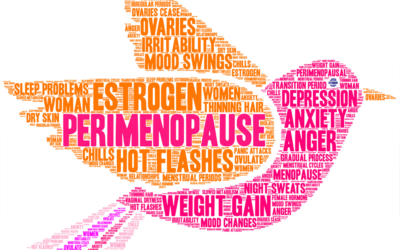

Are You Navigating the Symptoms of Perimenopause?

When I was in my mid-forties I started experiencing a number of seemingly unrelated symptoms – weight gain, brain fog, sore joints, and fatigue. I tried all sorts of one-off fixes – diets, exercise programs, and magic pills – without success. It wasn’t until my period started changing and I experienced hot flashes that the penny dropped and I connected everything to perimenopause. Did it happen like that for you too?
I wonder why there isn’t more talk about perimenopause? After all, it happens to all ladies, although it’s true that some have more challenges with it than others.
Perimenopause (and menopause) is the bookend to puberty, the reproductive part of our lives. So it includes a lot of hormone changes as the reproductive hormones – primarily estrogen and progesterone – naturally decline.
But the real challenge comes with how those changes impact our wellbeing. Like mood swings, inability to sleep, extreme fatigue, joint pain, digestive issues, hot flashes, night sweats, low sex drive and weight gain. What’s up with all that? Why can’t we just wind up our periods and call it a day?
There are two paths for getting help with perimenopause. The medical path and the lifestyle path. Unfortunately, many doctors are not well equipped to help. The American Association of Retired Persons reports most medical schools and residency programs don’t teach physicians in training about menopause. To make matters worse, a recent survey found that just 20% of ob-gyn residency programs provide any kind of menopause training.
When asked, 3 out of 4 ladies reported they did not get adequate treatment when they brought perimenopausal and menopausal concerns to their doctors. And 84% of women say their symptoms interfere with their lives and some are even debilitating.
One of the main areas where doctors should be able to help is in prescribing Hormone Replacement Therapy (HRT). Even though treatment has changed dramatically over the past decade, many doctors are unaware. The new body identical treatment is administered in patches or gel and poses none of the earlier health concerns for breast cancer and heart disease. The topical delivery method means that the liver is completely bypassed, and that absorption through the skin dramatically changes the health risks. Dr. Louise Newson, The Menopause Doctor, goes so far as to encourage women to consider taking body identical HRT for the protections it provides against heart disease, osteoporosis, diabetes and Alzheimer’s.
The other path to get help with the symptoms of perimenopause is through lifestyle. There is a lot that lifestyle habits and behaviors can do to demystify the changes. It turns out the healthy practices of diet and exercise that ladies maintained before perimenopause are unlikely to suit them very well once they enter perimenopause. As our nutrition needs change, so does our digestion. We no longer need all the protein we used to eat, and our sensitivity to sugar and processed foods heightens. Bloating, brain fog, joint pain and weight gain result.
And with hormonal changes to our muscles and joints, the type of exercise and movement that is beneficial also changes. Even if you have always been athletically active, the fatigue and joint pain can make ambitious workouts very difficult. In fact, high impact and anaerobic exercise can cause stress to the system and result in the production of cortisol, the stress hormone. The timing and type of movement you choose take on new importance.
Hormonal changes impact sleep, especially when combined with food choices and stress. So figuring out new sleep hygiene habits are vital to being able to restore the body each night with quality sleep. As we sleep, the body is busy removing dead cells burning fat and rebuilding tissue. The brain catalogues the day’s experiences and builds up memories. Without adequate sleep, the body is stressed when it cannot carry out these maintenance functions and produces cortisol in response. That in turn stimulates appetite, which produces more insulin leading to fat production (and stubbornly stored around the middle). So getting enough good sleep is vital to being able to adapt through the changes of perimenopause.
And finally, mindfulness – getting your head in the game is so important. As it happens, the mind can only focus on one thing at a time. So if you control some of the things you tell yourself and make them positive things, you will benefit from that. Rather than tell yourself that you’re a lazy slob or beat yourself up because you don’t have enough willpower, you tell yourself that you’re an intelligent woman and the goal is achievable. Meditation is a great way to calm the mind, focus on positive things and create endorphins. This can really help to create positivity, reduce cortisol levels and help with sleep.
Are you satisfied with the support your doctor has been giving you for the symptoms of perimenopause? Some symptoms are best resolved using HRT. But many more can be resolved by taking a lifestyle approach.
The beginning of my perimenopausal journey didn’t go well, and I’m determined to help ladies navigate this chapter of their lives so they can take control of the next decades and live their best lives.
To find out how you can navigate the symptoms of perimenopause, click the button to book your free call with Dyna Vink, Health and Nutritional Coach.
Top 11 symptoms of Perimenopause

Perimenopause is the transition phase before menopause. During this time the ovaries release increasingly lower levels of hormones. Working less efficiently than before, the ovaries are also producing fewer eggs and preparing to cease production altogether. This phase typically begins in your 40s, but can vary from one woman to another. It can last between 4-15 years.
Symptoms of Perimenopause
If you start experiencing one or more changes, you are likely experiencing perimenopause. Some are subtle and others are significant. While some women go through perimenopause and hardly break a sweat, others suffer from intense perimenopausal symptoms. Here are the top 11:
1. Irregular periods
One of the most obvious signs of perimenopause is irregular periods. Occasionally, you’ll notice heavier and longer periods (when estrogen spikes), while at other times, you’ll notice lighter and shorter periods (when estrogen drops). Skipped periods are to be expected as well.
2. Hot flashes
Hormone fluctuations also cause hot flashes, which affect roughly 8 out of 10 women. They’re usually described as a sudden feeling of heat, sweatiness, and redness in the face. Night sweats are similar to hot flashes, but they occur in your sleep. Hot flashes can occur for as long as 15 years and up to 75 times a day.
3. Vaginal dryness
Another sign of perimenopause is vaginal dryness due to the reduced production of estrogen. Vaginal changes such as the thinning and drying of vaginal tissues can create itchiness and irritation. The result is painful intercourse and a decline in sex drive.
4. Breast tenderness
Pain or tenderness in the breasts, in addition to changes in size, are quite common during perimenopause. Fortunately, this tends to disappear once menopause begins.
5. Mood swings
Mood swings are also caused by lower levels of estrogen. The North American Menopause Society reported 23% of women experience mood swings before, during, or after menopause. This perimenopausal symptom can cause irritability, depression, anxiety, and crying jags.
6. Sleep disturbances
Sometimes attributed to hot flashes or night sweats, perimenopause tends to alter sleep patterns. You may get less restful sleep at night and wake up feeling tired.
7. Low sex drive
The dropping levels of estrogen and testosterone are connected with lower sex drive during perimenopause. Women might notice their sexual arousal and sensitivity have also diminished.
8. Brain Fog
Many women say it’s harder to concentrate or remember things during perimenopause. Losing your train of thought, misplacing items, or forgetting appointments may become more common. Research shows that hormone imbalances during perimenopause impair learning and verbal memory. Lack of restful sleep increases this problem.
9. Bone density
The loss of estrogen also impacts the musculoskeletal system. This symptom can create achy joints and decrease in bone density. Osteoporosis is a condition that develops when you lose bone density more quickly than your body is able to replace it.
10. Fatigue
Sleep disturbances can impact the body’s ability to perform normal maintenance, repair and clean-up. This affects the brain as well as the body. The result is that women can feel crushing fatigue, both physically and mentally.
11. Weight Gain
As hormones decline, metabolism is affected. A slower metabolism, combined with fatigue and other symptoms like joint pain, may also mean that women are less active. If they are less active, they may also eat more, or eat things that do not support their body’s requirements. All these factors combined can lead to weight gain, especially around the middle.
#lifestyleapproach#perimenopause #menopause #sleepwell #wellness #holistichealth

Holistic Nutrition Lifestyle | Copyright © 2025 | All Rights Reserved
“This site is not a part of the Facebook website or Facebook Inc. Additionally, this site is NOT
endorsed by Facebook in any way.
FACEBOOK is a trademark of FACEBOOK, Inc.”